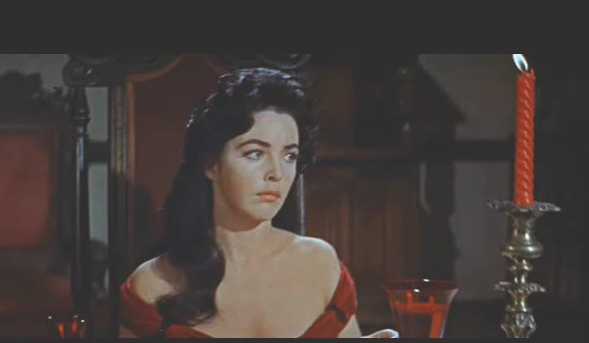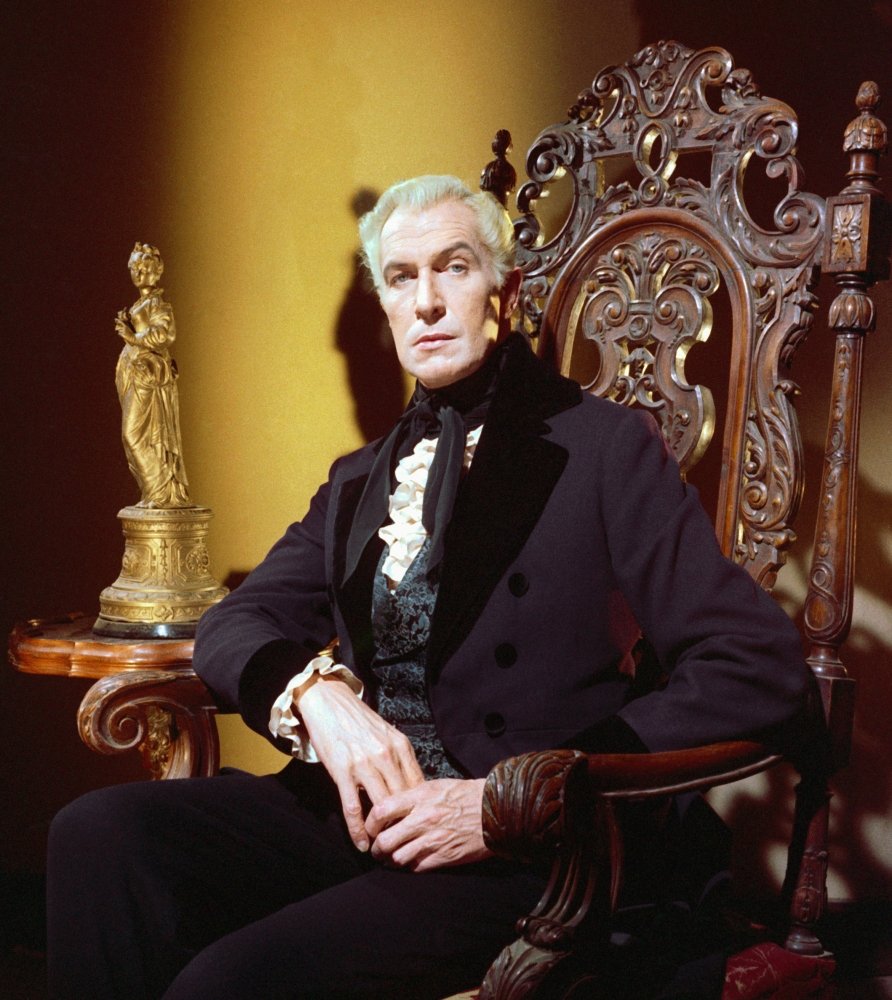Synopsis of The Fall of the House of Usher
Edgar Allen Poe’s classic tale of murder, madness and necrophilia in the ancient ancestral home of the tragic Usher family. Vincent Price is the last male in the ill-fated line of Ushers, haunted by the crimes of his ancestors. He’s obsessed by the idea that only the complete annihilation of himself and his sister can end the Usher evil. This leads to The Fall of the House of Usher.
The Fall of the House of Usher (1960) starring Vincent Price, Mark Damon, Myrna Fahey, by Roger Corman
Reviewed by: The Masked Reviewer
![]() Philip Winthrop (Mark Damon) travels to his fiancee’s home to see her again after many months. Madeline Usher (Myrna Fahey) has been recovering from an unknown illness, and has written him that she can’t stay at home any longer. Her brother Roderick (Vincent Price) doesn’t agree with her self diagnosis, and claims that she cannot leave the House of Usher. Philip begins investigating this strange house, and unsettling current occupants. He discovers the house’s horrible secrets, and Usher family secrets as well. Will he, and Madeline escape this evil house? Watch House of Usher to find out.
Philip Winthrop (Mark Damon) travels to his fiancee’s home to see her again after many months. Madeline Usher (Myrna Fahey) has been recovering from an unknown illness, and has written him that she can’t stay at home any longer. Her brother Roderick (Vincent Price) doesn’t agree with her self diagnosis, and claims that she cannot leave the House of Usher. Philip begins investigating this strange house, and unsettling current occupants. He discovers the house’s horrible secrets, and Usher family secrets as well. Will he, and Madeline escape this evil house? Watch House of Usher to find out.
Cast of characters
- Philip Winthrop (Mark Damon, Black Sabbath) : Madeline’s fiance, and stranger to the Usher household. He is a character that is charming, and with commonsense, a pleasant surprise from the usual type of hero in these kind of stories.
- Madeline Usher (Myrna Fahey, Zoro) : Philip’s fiancee, that fears, and yet obeys her brother for some mysterious reason. An intelligent young woman trapped in her own home. She is very similar to a glass doll, beautiful, yet extremely fragile.
- Roderick Usher (Vincent Price, Comedy of Terrors) : Roderick is an eerie, yet tragic character. He, and his sister share the same disease, only his far more advanced. Sound gives him great pain, but the silence is maddening.
- Bristol (Harry Ellerbe) : The Usher’s family butler that knows more than he says.

The production value is incredible, and the Usher house has the feel of a living nightmare. The house is surrounded by a fire damaged forest (The forest actually burnt down before filming the movie.) , and a large bog practically swallowing the Usher house.
The script is thought out, and well written. The actors, and actress all performed well, but of course they pale in comparison to the great Vincent Price. He brought the character Roderick to life, and I wish I could forget this disturbing individual. Vincent Price played more than sympathetic characters, and this performance proves it.
The acting is excellent, the script is interesting, the designs are lavish, and the sets are an incredible sight to see. The house is character all by itself without becoming a cartoon, or coming to life. Overall House of Usher is great film, and deserves all the praise it has been given.
I rate this film 5/5
Editorial review of The Fall of the House of Usher courtesy of Amazon.com
Vincent Price brings a theatrical flourish to the role of Roderick Usher, a brooding nobleman haunted by the dry rot of madness in his family tree. This being Poe, there’s a history of family madness and melancholia, a premature burial, and a sense of doom hanging over this gloomy, crumbling mansion. Roger Corman sold stingy AIP pictures on the concept by claiming “The house is the monster,” or so goes the oft-told story. True or not, Corman (with the help of his brilliant art director Daniel Haller and legendary cinematographer Floyd Crosby) creates an exaggerated sense of isolation and claustrophobia with the sunless forest and funereal fog that holds the house and its inhabitants prisoner in a land of the dead.
It doesn’t quite look real (some of the effects are downright phony, notably the apocalyptic climax), and none of the costars can hold a candle to Price’s elegant, haunted performance (often speaking in no more than a stage whisper), but it’s a triumph of expressionism on a budget. Shot in rich, vivid color and CinemaScope, from a literate script by genre master Richard Matheson, this is stylish gothic horror in a melancholy key. It was such a success that Corman reunited his core group of collaborators for the follow-up The Pit and the Pendulum the very next year. Corman’s “Poe Cycle” was born. MGM’s widescreen disc also features commentary by director-producer Corman, his first-ever such contribution. –Sean Axmaker



